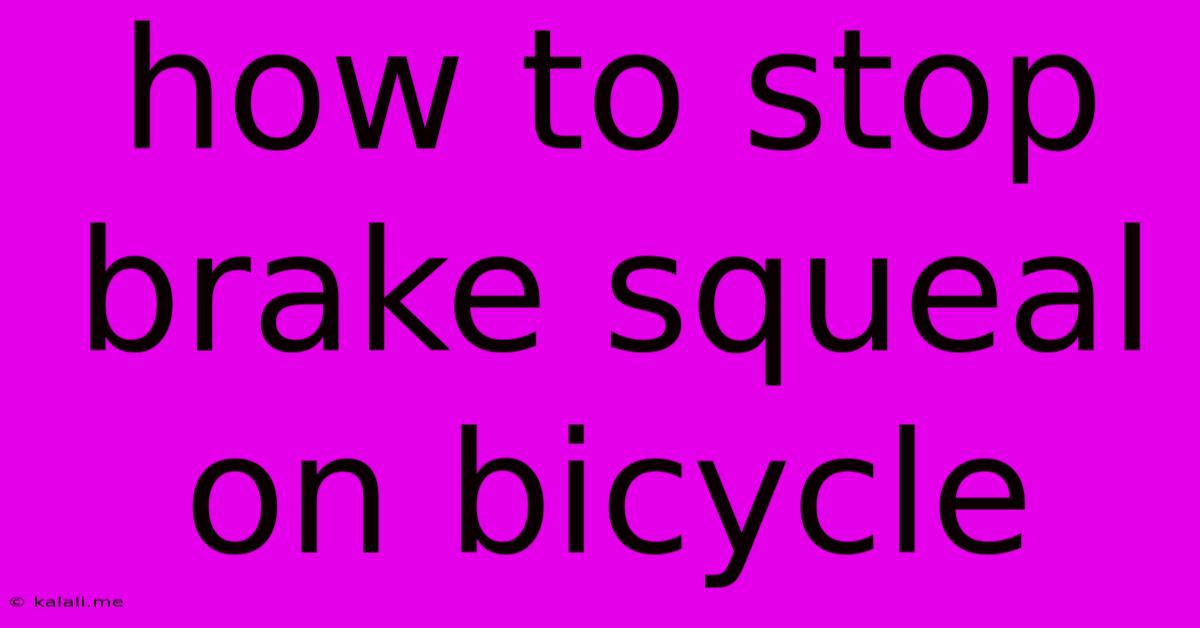How To Stop Brake Squeal On Bicycle
Kalali
May 19, 2025 · 4 min read

Table of Contents
How to Stop That Annoying Bicycle Brake Squeal
Bicycle brake squeal. That high-pitched, ear-piercing sound that can ruin a perfectly good ride. It's a common problem, but thankfully, there are several ways to tackle it. This article will guide you through troubleshooting and fixing brake squeal, helping you get back to enjoying silent, smooth rides. This guide covers everything from simple cleaning to more involved adjustments.
Understanding Bicycle Brake Squeal: Before diving into solutions, it's helpful to understand why brakes squeal. The screeching sound is typically caused by vibrations between the brake pads and the rim (for rim brakes) or rotor (for disc brakes). These vibrations create high-frequency sound waves, resulting in that dreaded squeal. Several factors contribute to these vibrations, including dirty brakes, worn pads, misaligned calipers, and even the brake pad material itself.
Troubleshooting and Fixing Rim Brake Squeal
Rim brakes are common on many bicycles, particularly older models or less expensive bikes. Squealing with rim brakes is often caused by one of the following:
- Dirty Brakes: Dirt, grime, and oil buildup on the brake rims can significantly increase friction and lead to squealing.
- Worn Brake Pads: Worn-out brake pads lose their effectiveness and can vibrate against the rim, resulting in squealing. Check for significant wear or uneven wear patterns.
- Misaligned Calipers: Improperly aligned brake calipers can cause uneven pressure on the rim, leading to squealing. The calipers should be equally spaced and parallel to the rim.
- Brake Pad Material: The material of your brake pads can influence squealing. Some compounds are more prone to squeal than others.
Solutions for Rim Brake Squeal:
- Clean the Brakes: Thoroughly clean your brake rims and pads with a degreaser and a clean cloth or brush. Pay attention to the contact area between the pads and the rim. Ensure everything is completely dry before re-assembling.
- Replace Worn Brake Pads: Replace your brake pads if they are significantly worn or show uneven wear. New pads offer better braking performance and reduce the likelihood of squealing.
- Adjust Brake Caliper Alignment: Check the alignment of your brake calipers. They should be equally spaced and parallel to the rim. Use the adjusting screws on the calipers to fine-tune their position. This might require some trial and error.
- Try Different Brake Pads: Consider switching to a different type of brake pad compound. Some pads are formulated to minimize squealing. Experimentation may be needed to find the right fit for your bicycle.
- Lightly Sand Brake Pads: (Use with caution!) Very lightly sanding the braking surface of new brake pads can sometimes improve performance and reduce squealing. However, only do this minimally, and ensure you only sand the braking surface.
Troubleshooting and Fixing Disc Brake Squeal
Disc brakes, while generally quieter than rim brakes, can also squeal. This often stems from:
- Dirty Rotors: Oil, grease, or dirt on the rotor can interfere with brake pad contact, creating squealing.
- Worn or Glazed Brake Pads: Similar to rim brakes, worn or glazed brake pads can lead to vibrations and noise.
- Contaminated Pads: Brake pads can become contaminated with oil or grease, leading to inconsistent braking and squealing.
Solutions for Disc Brake Squeal:
- Clean the Rotors: Use a specialized disc brake cleaner to remove any dirt, oil, or grease from your rotors. This requires a clean, dry cloth or dedicated cleaning tool for maximum effectiveness.
- Replace Worn or Glazed Brake Pads: Replace brake pads if they are worn or exhibit a glazed surface.
- Bed in New Brake Pads: New disc brake pads need to be "bedded in" to ensure proper contact with the rotor. This involves several controlled braking applications at various speeds to create an even surface. The process and instructions vary slightly depending on your pads' specific design.
- Check Rotor Trueness: A warped or bent rotor can also cause squealing. Check the rotor for any significant bends or imperfections. Sometimes a slightly bent rotor can be corrected through careful adjustment, but you'll usually require specialized tools to get this right.
Preventative Maintenance:
Regular cleaning and inspection of your brakes are crucial for preventing squeal and maintaining optimal braking performance. This includes:
- Regular Cleaning: Clean your brakes after every muddy or wet ride.
- Inspect Brake Pads: Regularly check the condition of your brake pads and replace them as needed.
- Proper Adjustment: Ensure your brake calipers or levers are correctly adjusted for optimal performance.
By following these troubleshooting steps and preventative measures, you can effectively eliminate that annoying brake squeal and enjoy smoother, quieter rides. Remember to always prioritize safety and consult a professional bike mechanic if you encounter persistent problems or are unsure about any repair procedure.
Latest Posts
Latest Posts
-
In The Office Or At The Office
May 19, 2025
-
Mr William Collins Pride And Prejudice
May 19, 2025
-
Is Ghusl Required After Getting Wet
May 19, 2025
-
Water Coming Out Of Exhaust Pipe
May 19, 2025
-
What Does Com Mean In Light Switch
May 19, 2025
Related Post
Thank you for visiting our website which covers about How To Stop Brake Squeal On Bicycle . We hope the information provided has been useful to you. Feel free to contact us if you have any questions or need further assistance. See you next time and don't miss to bookmark.